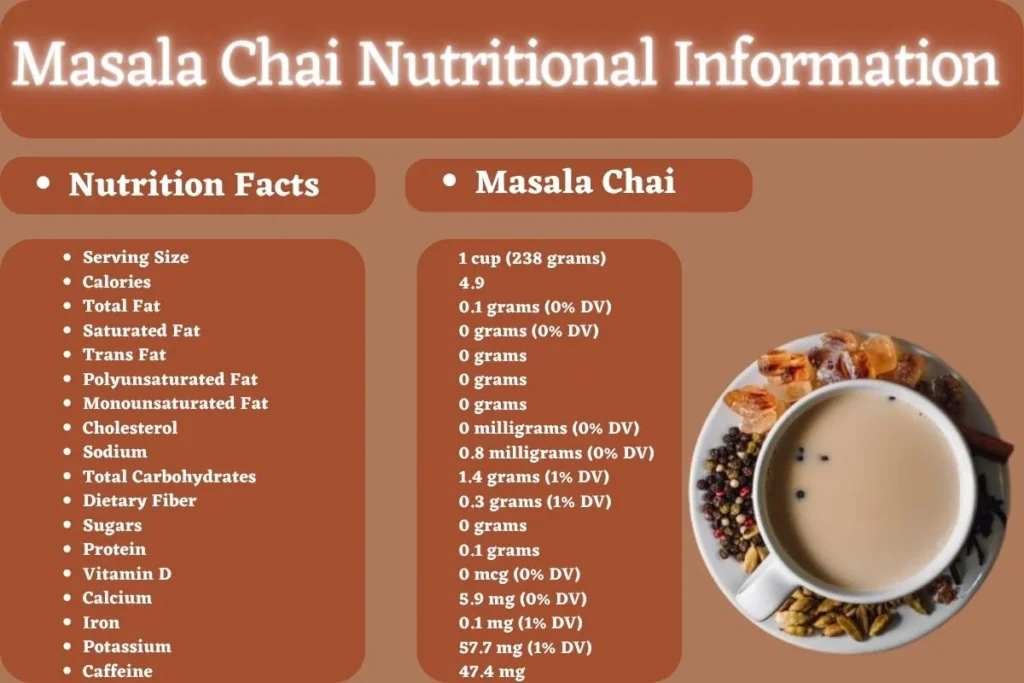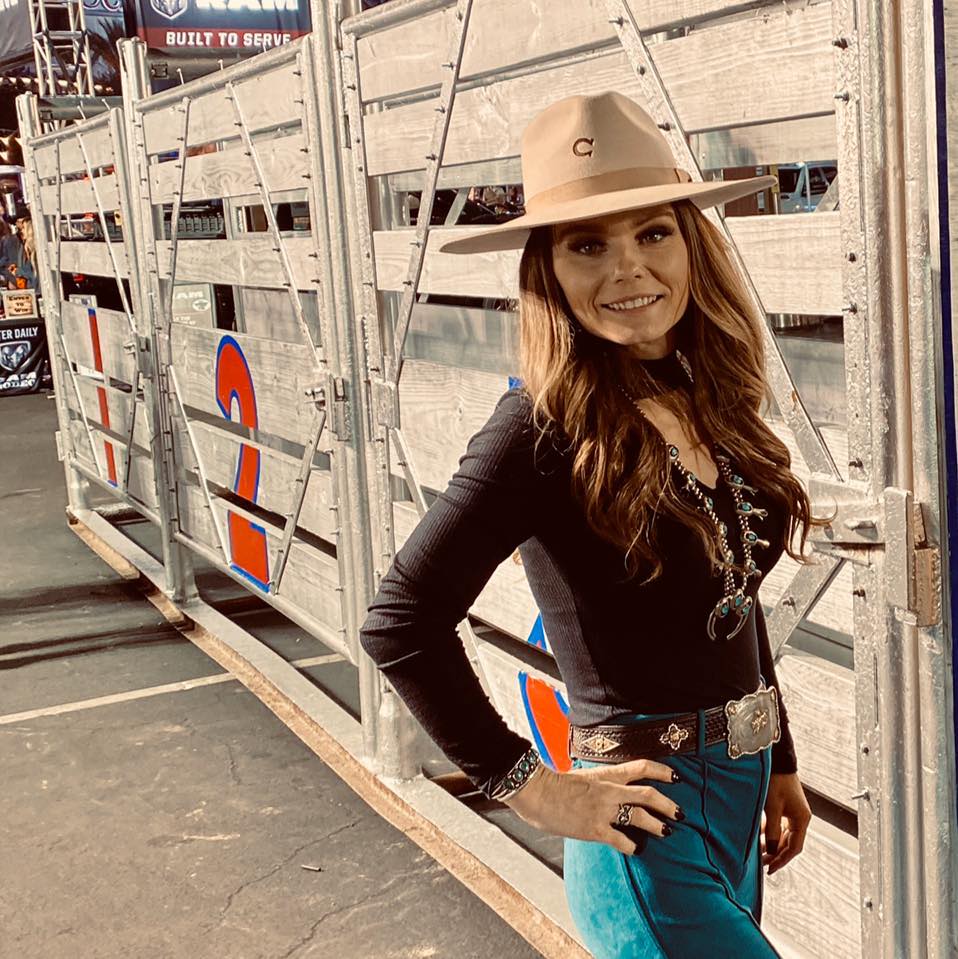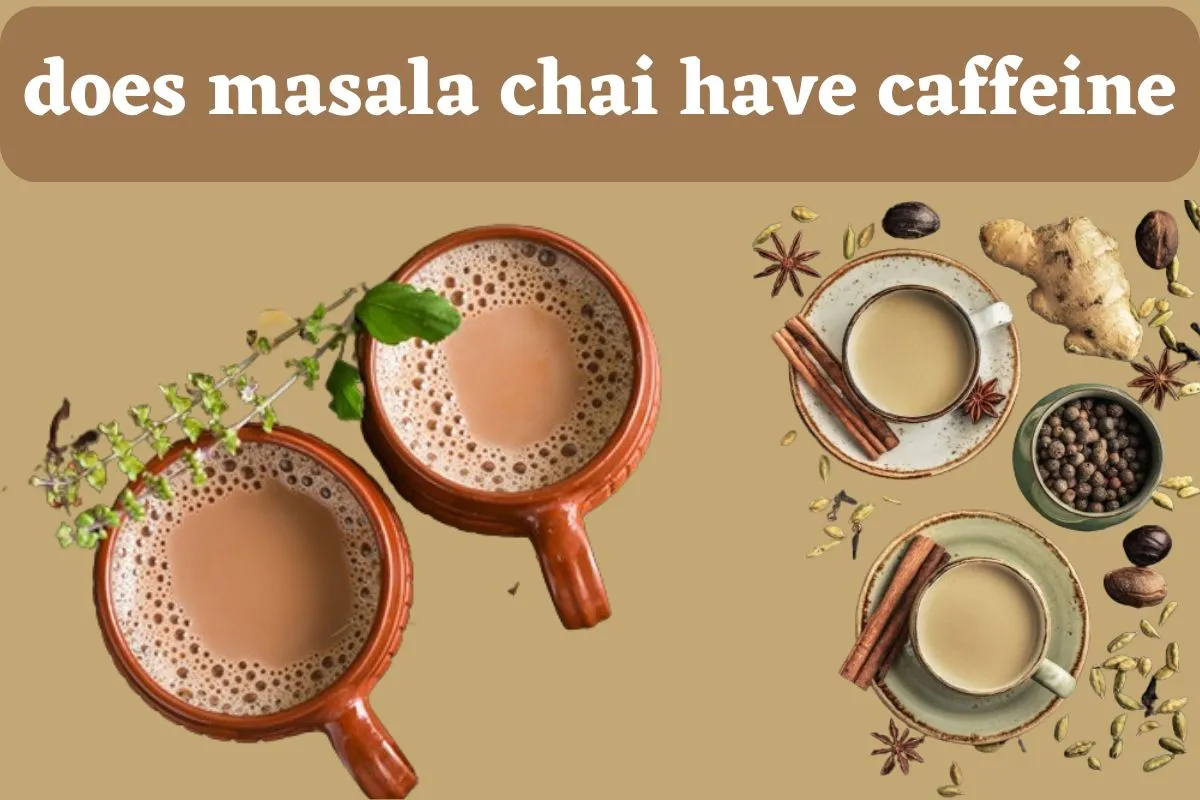Masala chai’s origins lie in the ancient Ayurvedic traditions of India, where spiced beverages were consumed for their wellness properties. While these early brews lacked caffeine, modern-day masala chai incorporates black tea as a core ingredient.
This fusion of tradition and stimulating black tea begs the question: Does Masala Chai Have Caffeine?, and if so, how much?
Importance of Knowing Caffeine Content in Masala Chai
Masala Chai, a traditional Indian spiced tea, is renowned for its unique blend of flavors and health benefits, making it a popular beverage worldwide. This aromatic tea combines black tea leaves with a variety of spices like ginger, cardamom, cinnamon, and cloves, often sweetened and enhanced with milk.
While masala chai offers a delightful taste experience, understanding its caffeine content is important for informed consumption. Certain brewing methods, the type of black tea used, and the serving size can all significantly impact the caffeine levels in your cup.
It’s essential to be aware of these factors, especially for those sensitive to caffeine, individuals with certain health conditions, or pregnant women, who may need to limit or avoid caffeine intake altogether.
Does Masala Chai Have Caffeine?
Yes, masala chai content caffeine. It traditionally contains caffeine, mainly because it is often made with black tea, which has a moderate amount of caffeine.
The caffeine content in Masala Chai can range from 30 to 70 milligrams per 8-ounce serving, depending on several factors such as the type of tea used (black, green, or white), the amount of tea and spices used, the brewing time, and whether milk or other additives are included.
The type of tea is a significant determinant of the caffeine content. Black tea, the most commonly used base for Masala Chai, contains the highest amount of caffeine among teas. Green tea and white tea, which are sometimes used as alternatives, contain less caffeine. Decaffeinated tea varieties offer a way to enjoy Masala Chai without the caffeine.
Brewing time and the amount of tea used also influence caffeine content; longer brewing or a higher ratio of tea increases caffeine levels.
Additionally, the milk and other additives in Masala Chai can affect how caffeine is absorbed in the body, with some studies indicating that milk proteins can bind to caffeine, potentially moderating its absorption rate.
For those looking to avoid caffeine, there are alternatives. For example, a homemade Masala Chai recipe can be prepared with caffeine-free rooibos tea and dairy-free milk options like oat milk, allowing for the enjoyment of this spiced beverage without caffeine.
This approach caters to varying dietary preferences and restrictions, maintaining the beloved flavors of Masala Chai while eliminating caffeine.
Masala Chai Variants and their Caffeine Content
While the classic Masala Chai recipe uses black tea with a blend of warming spices, there are many interesting variations you can explore.
Here are a few popular options:
Classic Masala Chai
This is the classic form, prepared with milk, sugar, cardamom, cloves, cinnamon, ginger, and black pepper in addition to black tea.
Ginger Masala Chai
This variation emphasizes the ginger content, adding a stronger and more pungent kick to the chai.
Cardamom Masala Chai
This chai highlights the cardamom pods, offering a more floral and citrusy aroma.
Vanilla Masala Chai
Vanilla extract or a vanilla bean can be added to the classic recipe for a touch of sweetness and a unique twist.
Eliichi Masala Chai
This South Indian version uses green cardamom (elaichi) instead of black cardamom, resulting in a slightly milder and sweeter chai.
Pink Masala Chai
Crushed beetroots are added to the traditional recipe for this beautiful pink-hued chai. It may also have a slightly earthy taste.
Kashmiri Masala Chai
This chai uses saffron, adding a luxurious touch and a subtle floral note. Since saffron is among the priciest spices available, this chai is fit for a special occasion.
Chocolate Masala Chai
For a decadent treat, chocolate powder or cocoa can be whisked into the classic chai for a rich and chocolaty beverage
Sugar-Free Masala Chai
Sugar substitutes like stevia or monk fruit sweetener can be used to create a diabetic-friendly or low-carb version of masala chai.
List of Ingredients in Masala Chai
Masala chai is renowned for its rich blend of spices and herbs. Here is a list of common ingredients used in making masala chai:
- Black Tea Leaves: The base ingredient of masala chai, black tea leaves provide the caffeine content and robust flavor profile.
- Cardamom Pods: Known for their aromatic and slightly sweet flavor, cardamom pods add a distinct taste to masala chai.
- Cinnamon Sticks: Cinnamon sticks impart a warm and slightly spicy flavor, enhancing the overall aroma and taste of masala chai.
- Fresh Ginger: Fresh ginger adds a zesty and pungent kick to masala chai, contributing to its soothing and invigorating qualities.
- Cloves: Cloves offer a strong and slightly bitter flavor with hints of sweetness, balancing the other spices in masala chai.
- Black Peppercorns: Black peppercorns add a subtle heat and depth of flavor to masala chai, complementing the other spices and enhancing their aromatic properties.
- Star Anise: Star anise lends a licorice-like flavor and a subtle sweetness to masala chai, contributing to its complex and layered taste profile.
- Whole Cardamom Pods: Whole cardamom pods, when cracked open, release their aromatic seeds, infusing masala chai with their distinctive flavor and fragrance.
- Fennel Seeds: Fennel seeds provide a mild and slightly sweet flavor with hints of licorice, enhancing the overall complexity of masala chai.
- Milk: Milk adds creaminess and richness to masala chai, creating a smooth and comforting texture.
- Water: Water is used as the primary liquid for brewing masala chai, allowing the flavors of the spices and tea leaves to infuse properly.
Masala Chai Nutritional Information

A single cup (238 grams) of Masala Chai offers a very low-calorie beverage. It contains only 4.9 calories, with a negligible amount of fat (0.1 grams), and no saturated, trans, polyunsaturated, or monounsaturated fats. You won’t find any cholesterol either. Masala Chai also has a minimal amount of sodium (0.8 milligrams).
It provides 1.4 grams of carbohydrates, including 0.3 grams of dietary fiber. There are no sugars in a standard cup of Masala chai, and it offers a small amount of protein (0.1 grams). Masala chai does contain some naturally occurring caffeine (47.4mg), along with trace amounts of calcium, iron, and potassium.
| Nutrition Facts | Masala Chai |
| Serving Size | 1 cup (238 grams) |
| Calories | 4.9 |
| Total Fat | 0.1 grams (0% DV) |
| Saturated Fat | 0 grams (0% DV) |
| Trans Fat | 0 grams |
| Polyunsaturated Fat | 0 grams |
| Monounsaturated Fat | 0 grams |
| Cholesterol | 0 milligrams (0% DV) |
| Sodium | 0.8 milligrams (0% DV) |
| Total Carbohydrates | 1.4 grams (1% DV) |
| Dietary Fiber | 0.3 grams (1% DV) |
| Sugars | 0 grams |
| Protein | 0.1 grams |
| Vitamin D | 0 mcg (0% DV) |
| Calcium | 5.9 mg (0% DV) |
| Iron | 0.1 mg (1% DV) |
| Potassium | 57.7 mg (1% DV) |
| Caffeine | 47.4 mg |
Alternatives to Masala Chai and their Caffeine Content
While masala chai is a beloved beverage cherished for its rich blend of spices and herbs, there are several alternatives available for those seeking a change or looking to explore different flavors. The following are some substitutes for masala chai:
Green Tea:
It is prized for its antioxidant properties and subtle grassy notes, making it a refreshing and invigorating beverage choice.
Herbal Tea Blends:
These caffeine-free blends offer a comforting and aromatic experience without the stimulating effects of traditional tea.
Rooibos Tea:
Red tea, or Rooibos tea, is a herbal beverage that comes from South Africa and doesn’t contain caffeine. It is a well-liked option for anyone searching for a caffeine-free substitute with a touch of sweetness because of its naturally sweet and nutty flavor profile.
Matcha Latte:
Matcha latte is made from finely ground green tea powder mixed with steamed milk, creating a creamy and frothy beverage with a vibrant green color.
Turmeric Latte (Golden Milk):
Turmeric latte, also known as golden milk, is made by simmering turmeric, ginger, cinnamon, and other spices in milk or a milk alternative. It is known for its vibrant golden hue and anti-inflammatory properties, offering a warming and comforting drink option.
Oolong Tea:
Chinese oolong tea is a traditional tea prized for its flowery scents and nuanced flavor profile. In terms of oxidation, it is in between green and black tea, making for a distinctive and complex cup.
| Beverage | Caffeine Content |
| Green Tea | 20-45 mg per 8 oz cup |
| Herbal Tea Blends | Caffeine-free |
| Rooibos Tea | Caffeine-free |
| Matcha Latte | 70-140 mg per 8 oz cup (Depends on the amount of Matcha used) |
| Turmeric Latte | Caffeine-free (Unless blended with tea/coffee) |
| Oolong Tea | 30-50 mg per 8 oz cup |
Recommended Daily Intake of Masala Chai
Does Masala Chai Have Caffeine? Yes, Masala Chai does contain caffeine, the amount in a single cup (238 grams), at 47.4 mg, is relatively modest. This represents about 11.8% of the Recommended Daily Intake (RDI) of caffeine, which is set at 400mg for healthy adults.
This means you could enjoy several cups of Masala Chai throughout the day and still remain within the generally accepted guidelines for safe caffeine consumption. If you’re sensitive to caffeine, however, it’s always a good idea to monitor your intake and adjust accordingly.
Conclusion
Does Masala Chai Have Caffeine? Yes, Masala chai does contain caffeine due to its base ingredient of black tea, albeit in varying amounts depending on the recipe and brewing method. Although there are certain advantages to caffeine use, it is important to use it sparingly and to be aware of one’s tolerance levels.
For those looking to enjoy the flavors of masala chai without the stimulating effects of caffeine, decaffeinated and herbal alternatives are readily available, providing a satisfying beverage option for tea lovers.
Frequently Asked Questions
Q1. What is masala chai made of?
Masala chai is a blend of black tea, warming spices, and usually milk and a sweetener. The most common spices include ginger, cardamom, cinnamon, cloves, and black pepper. The exact spice blend can vary, leading to diverse and delicious flavor profiles across different recipes.
Q2. Can you drink masala chai every day?
Yes, you can enjoy masala chai every day in moderation. The spices in masala chai offer potential health benefits, and the caffeine content is lower than coffee. However, if you’re adding significant amounts of sugar or have caffeine sensitivities, it’s best to be mindful of your consumption.
Q3. Is masala chai tea healthy?
Masala chai can offer some health benefits. The spices used, like ginger and cinnamon, have anti-inflammatory and antioxidant properties. However, the addition of milk and sweeteners can make it less healthy. Opting for unsweetened versions or using natural sweeteners can make masala chai a healthier choice.
Q4. Does masala chai make you sleepy?
Masala chai generally does not make you sleepy. While it contains black tea, and therefore caffeine, the caffeine content is lower than coffee. Additionally, spices like ginger in masala chai can have an invigorating effect. However, if you’re particularly sensitive to caffeine or drink it very close to bedtime, it could potentially disrupt your sleep.
Q5. What does masala chai taste like?
Masala chai offers a complex and delicious flavor profile. It’s a warm, spicy, and slightly sweet beverage. The dominant flavors come from the spices – ginger, cinnamon, cardamom, cloves, and black pepper – creating a comforting and fragrant taste. The addition of milk adds creaminess, while sweetener balances the spice blend.

Rossi Glover, the passionate Owner of Grand Lake Coffee, infuses every cup with her love for coffee and dedication to quality. With an extensive background in the art and science of coffee, Rossi is not just a connoisseur but a storyteller, sharing the intricate tales behind each brew.

